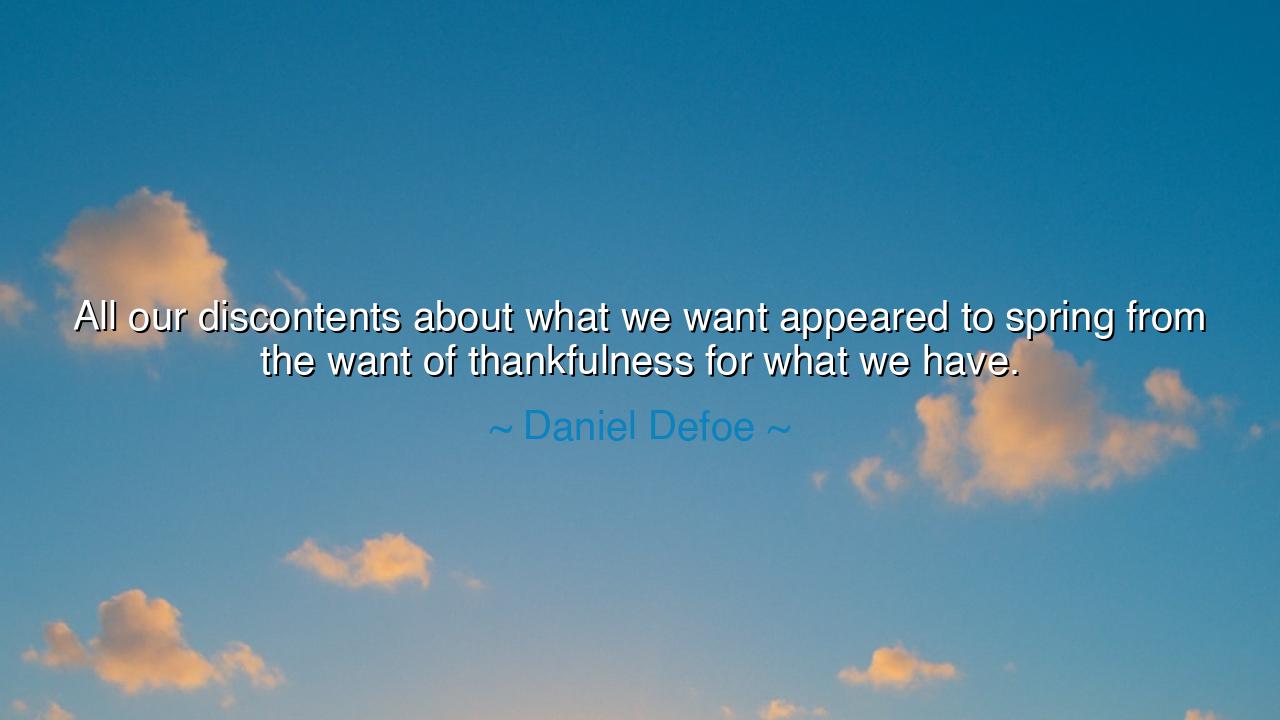
All our discontents about what we want appeared to spring from
All our discontents about what we want appeared to spring from the want of thankfulness for what we have.






The words of Daniel Defoe, “All our discontents about what we want appeared to spring from the want of thankfulness for what we have,” strike like a mirror held before the restless soul of humanity. They expose the hidden root of dissatisfaction: not that we lack, but that we fail to recognize the abundance already within our grasp. Defoe, the author of Robinson Crusoe, wrote often of man’s struggle between desire and gratitude, between craving what lies beyond and cherishing what lies within. His wisdom is as relevant now as it was in his own time: when the heart forgets thankfulness, it is devoured by endless discontent.
To say that discontent springs from ingratitude is to reveal a timeless truth. The poor man, who gives thanks for his bread, may feel richer than the king who covets another’s throne. The child who rejoices in a single toy may be happier than the one surrounded by abundance but blind to its worth. It is not the measure of possessions that determines peace, but the measure of gratitude within the heart. The ancients saw this clearly. The Stoic Epictetus taught, “He is a wise man who does not grieve for the things which he has not, but rejoices for those which he has.” Defoe’s words walk the same path: gratitude is the cure for the poison of envy.
Defoe himself gave life to this lesson in Robinson Crusoe, where the castaway, alone on his island, first despairs of what he has lost — friends, home, civilization. Yet in time he learns to give thanks for what remains: food from the land, shelter from the storm, strength in his body, and even companionship in a tamed animal. The more he practiced gratitude, the less his discontent consumed him. Crusoe’s survival was not only a triumph of skill, but of perspective. By shifting from lamentation to thankfulness, he found not only endurance but peace.
History too bears witness. Consider the pilgrims of Plymouth, who after a brutal winter of hunger and loss, gathered with their Native allies to celebrate the harvest. They might have drowned in sorrow for the many who perished, yet they chose instead to give thanks for the harvest that sustained the living. Out of gratitude, they found unity and hope. Had they dwelled only on what they wanted, despair would have broken them; instead, thanksgiving gave them strength to endure. In both Defoe’s fiction and history’s truth, we see that gratitude transforms hardship into blessing.
The phrase “want of thankfulness” reveals the heart’s blindness. For often, it is not what we lack that wounds us, but our inability to see what we already possess. The ungrateful man walks in a garden but sees only weeds. The grateful man, walking in a desert, sees beauty in a single flower. Ingratitude creates a famine of the soul; gratitude creates abundance even in scarcity. This is why Defoe saw thankfulness not as mere courtesy, but as the foundation of human happiness.
The lesson for us is clear: when discontent arises, do not first look to acquire more, but to appreciate what you already hold. The root of envy, jealousy, and endless striving lies not in lack of possession, but in lack of perception. Gratitude opens the eyes; ingratitude blinds them. To live in constant desire is to live in chains. To live in thankfulness is to walk in freedom.
As practical action, practice daily thanksgiving. Each morning or evening, name aloud the blessings you already possess — health, relationships, shelter, opportunities, even the simple gift of breath. When discontent stirs within you, pause and ask, “Have I given thanks for what I already have?” By this discipline, desire will no longer enslave you, and gratitude will bring peace to your spirit.
Thus, the wisdom of Daniel Defoe endures: discontent is born of ingratitude, but gratitude is the cure. To forget what we have is to hunger endlessly; to give thanks is to be filled, even in want. Let us then live not as slaves to desire, but as masters of gratitude, for in thankfulness we find both contentment and joy.






AAdministratorAdministrator
Welcome, honored guests. Please leave a comment, we will respond soon